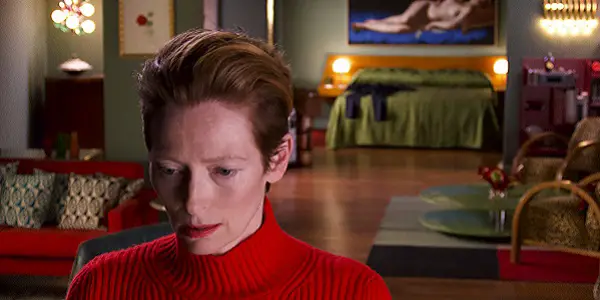NYFF 2020: THE HUMAN VOICE: Madness and Melancholy

Lee Jutton has directed short films starring a killer toaster,…
The names Pedro Almodóvar and Tilda Swinton are individually enough to spark interest in the vast majority of film lovers. (If they don’t, then I honestly question your taste.) But both of those names, together, on the same project? Which happens to be the first-ever English-language film from the renowned Spanish auteur, responsible for such classics as All About My Mother and Talk to Her? That’s not just interesting, that’s an event.
Fortunately, the film in question, an adaptation of a one-act monodrama by Jean Cocteau, lives up to those lofty expectations. A remarkable showcase for Swinton at her most powerfully expressive, The Human Voice chronicles the end of a relationship and the unraveling of a woman in the span of a mere thirty minutes. Yet despite the film’s short length, one comes away feeling more satisfied with the emotional journey of the central character than one often does when watching films four times as long.
All By Myself
Cocteau’s play was originally staged in 1930 as one woman talking on the telephone to her lover, who is leaving her to marry another woman. The person on the other end of the line is invisible and inaudible; the focus is on the woman, alone, as she describes her thoughts and feelings to the unseen caller and the audience. The sheer audacity of the play has inspired many imitators, including Almodóvar on a previous occasion (his Women on the Verge of a Nervous Breakdown begins with its protagonist in a similar situation). But it’s hard to imagine an actor better suited for such a role than Tilda Swinton, whose unusual beauty – equal parts alien and human – pulls you in, and whose immense talent keeps you engaged even when she is the only one onscreen.

When we first meet Swinton’s nameless protagonist, she is purchasing an ax in a hardware store, which she then brings home and, in a fit of frustrated rage, uses to hack apart an elegant suit that has been set out neatly on her bed, waiting for her lover to come and collect it with the rest of their things. It is an extremely melodramatic gesture, but one that feels entirely fitting for Swinton’s character, an actor of a certain age who is feeling increasingly panicked over this person’s lingering absence.
As Swinton informs her lover (and us), it is not the first time they have left her – but in the past, they have always come back. This time, however, appears to be different. Three days have passed, and neither hide nor hair of them has been seen. She is entirely alone, with the exception of a delightful shaggy dog named Dash who also appears to be missing the person in question as it snuggles up against the suit in the bed and wanders the halls, tail wagging in anticipation for an arrival that may never happen. In desperation, Swinton swallows a handful of candy-colored pills, hoping that when her lover finally shows up to collect their possessions, they’ll find her unconscious as a punishment for their betrayal. Instead, she is awakened by their phone call and a turbulent storm of emotions ensues.
Spectacular Swinton
At first, Swinton attempts to pretend that she has gone about her life as normal: lunching with friends, attending the theater, and even consulting with a therapist. (In a keen bit of foreshadowing of what is to come in the film’s final act, she notes, “If there’s one thing I don’t have to worry about, it’s my metabolism. It burns everything.”) However, as the call progresses, Swinton’s carefully constructed facade gradually collapses, revealing the raw distress that has enveloped her in the immediate aftermath of this abandonment. Yet amidst these unhinged ramblings, her desire to move on becomes increasingly clear. “In the future, I’m going to be a practical woman for a change,” she declares. But before that, she must cut all ties to the past, once and for all.

Almodóvar’s films are known for their use of bold color and striking design, and The Human Voice is no different. The spacious apartment where Swinton’s character lives is cluttered with artwork, antiques, and other signifiers of her privileged status in the world, yet it’s clear that none of these lovely items – including the Chanel box in which she stores her precious letters – can fill the void left by her lover.
Swinton’s impeccably curated home in The Human Voice is reminiscent of the home of the titular character in Rainer Werner Fassbinder’s The Bitter Tears of Petra Von Kant, another story of an artist of increasing age wrestling with the realization that her lover does not return her devotion. Fassbinder’s film, based on his own play of the same name, is shot entirely within that apartment in a bold embrace of the story’s theatrical roots; Almodóvar takes that concept a step further in The Human Voice and has Swinton’s apartment, where she spends the vast majority of the film, exist on an actual soundstage. At one point, he even allows us to view her abode from above, giving us the impression that she is trapped in an exceedingly glamorous diorama. When Swinton does enter and exit the apartment, her richly colored outfits – voluminous dresses and tailored jumpsuits in bright reds and deep blues, made all the more eye-catching by their contrast with her pale skin – stand out starkly amid the bare, industrial interior of the stage.

Yet even with these flourishes, The Human Voice never feels uncomfortably theatrical. Rather, these touches highlight the contradictions that inevitably surface between the comfortable lives we attempt to curate for ourselves and the cruel reality of the world outside. And, as Swinton’s tour de force performance shows us, sometimes we’re better off destroying our comfort zones entirely so that we cannot run the risk of trying to return to them. Sometimes, we need to burn it all down and start again.
Conclusion
The beautiful boldness of The Human Voice makes it clear that Pedro Almodóvar and Tilda Swinton are a match made in film lover’s heaven. You’re left feeling utterly satisfied by this short film while also hoping that they’ll team up again for a feature in the near future.
What do you think? Do you think Pedro Almodóvar and Tilda Swinton are a good match of director and actor? Share your thoughts in the comments below.
The Human Voice is currently screening as part of the Spotlight section at the 2020 New York Film Festival.
Does content like this matter to you?
Become a Member and support film journalism. Unlock access to all of Film Inquiry`s great articles. Join a community of like-minded readers who are passionate about cinema - get access to our private members Network, give back to independent filmmakers, and more.
Lee Jutton has directed short films starring a killer toaster, a killer Christmas tree, and a not-killer leopard. Her writing has appeared in publications such as Film School Rejects, Bitch: A Feminist Response to Pop Culture, Bitch Flicks, TV Fanatic, and Just Press Play. When not watching, making, or writing about films, she can usually be found on Twitter obsessing over soccer, BTS, and her cat.













